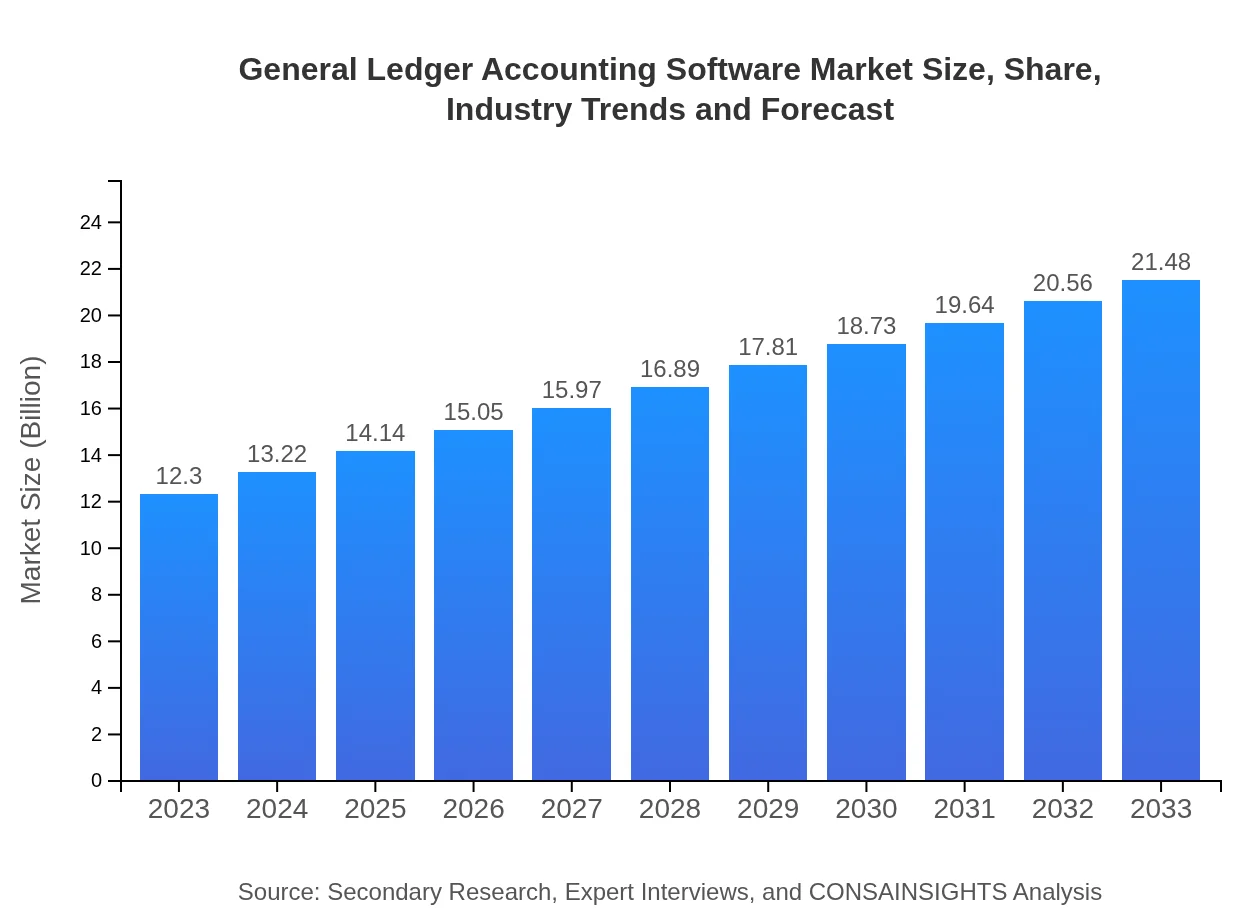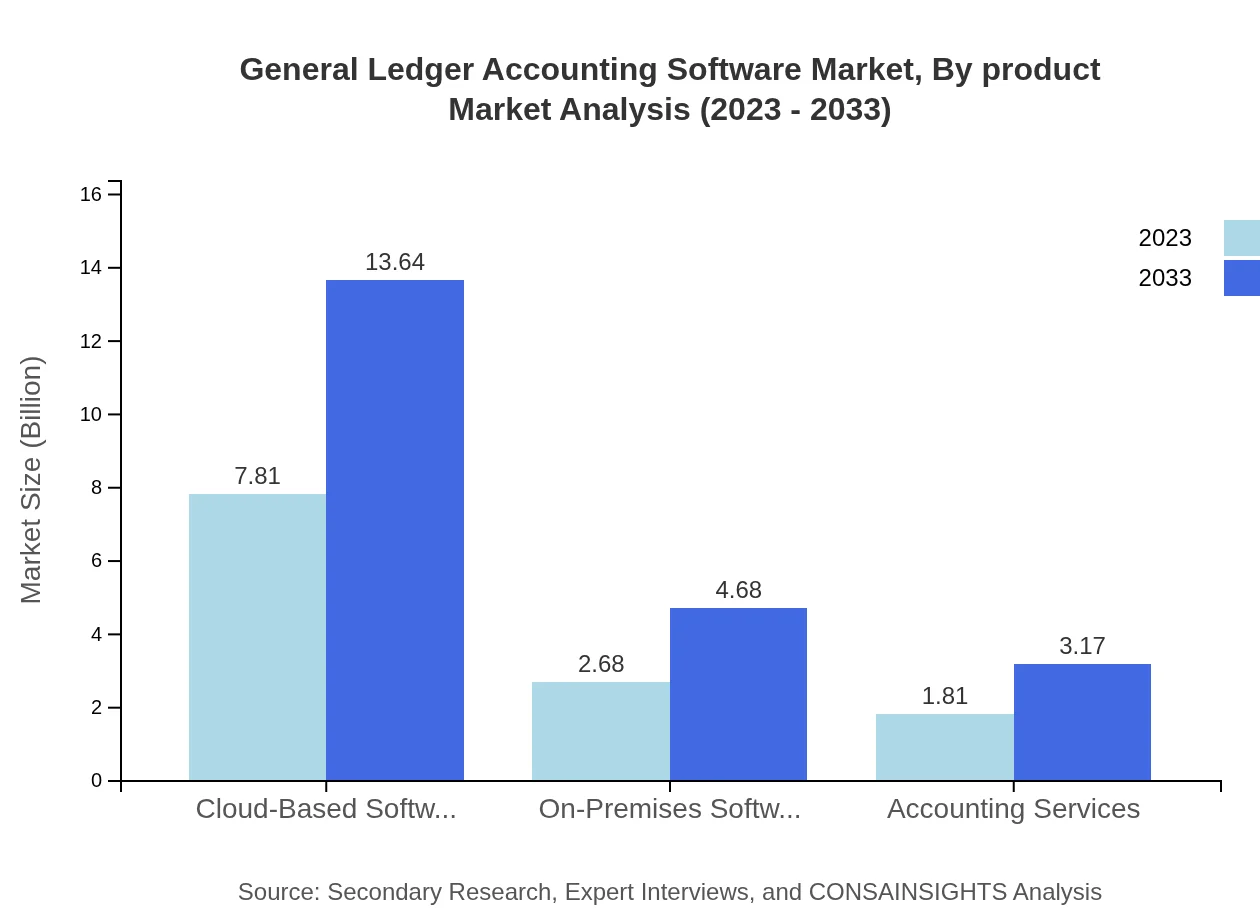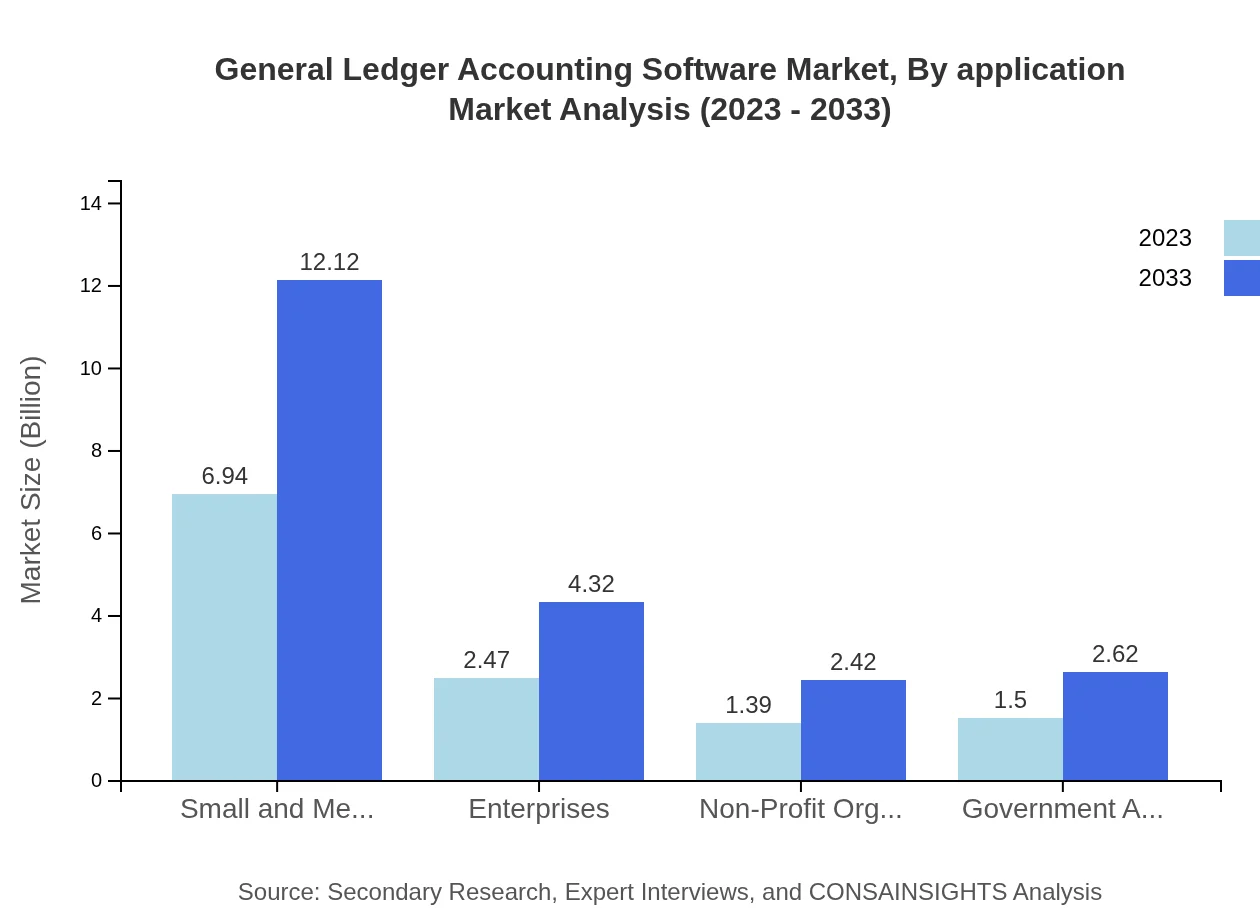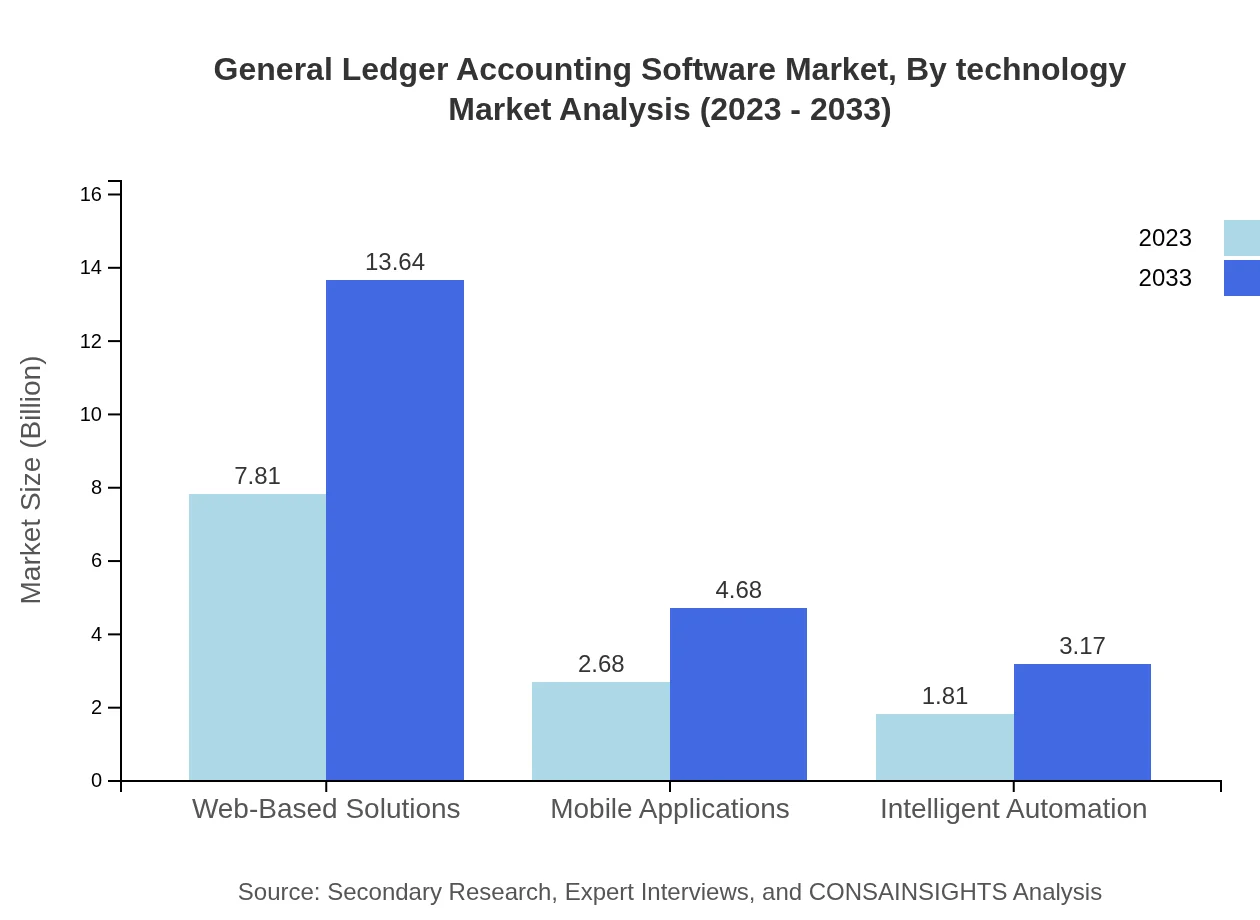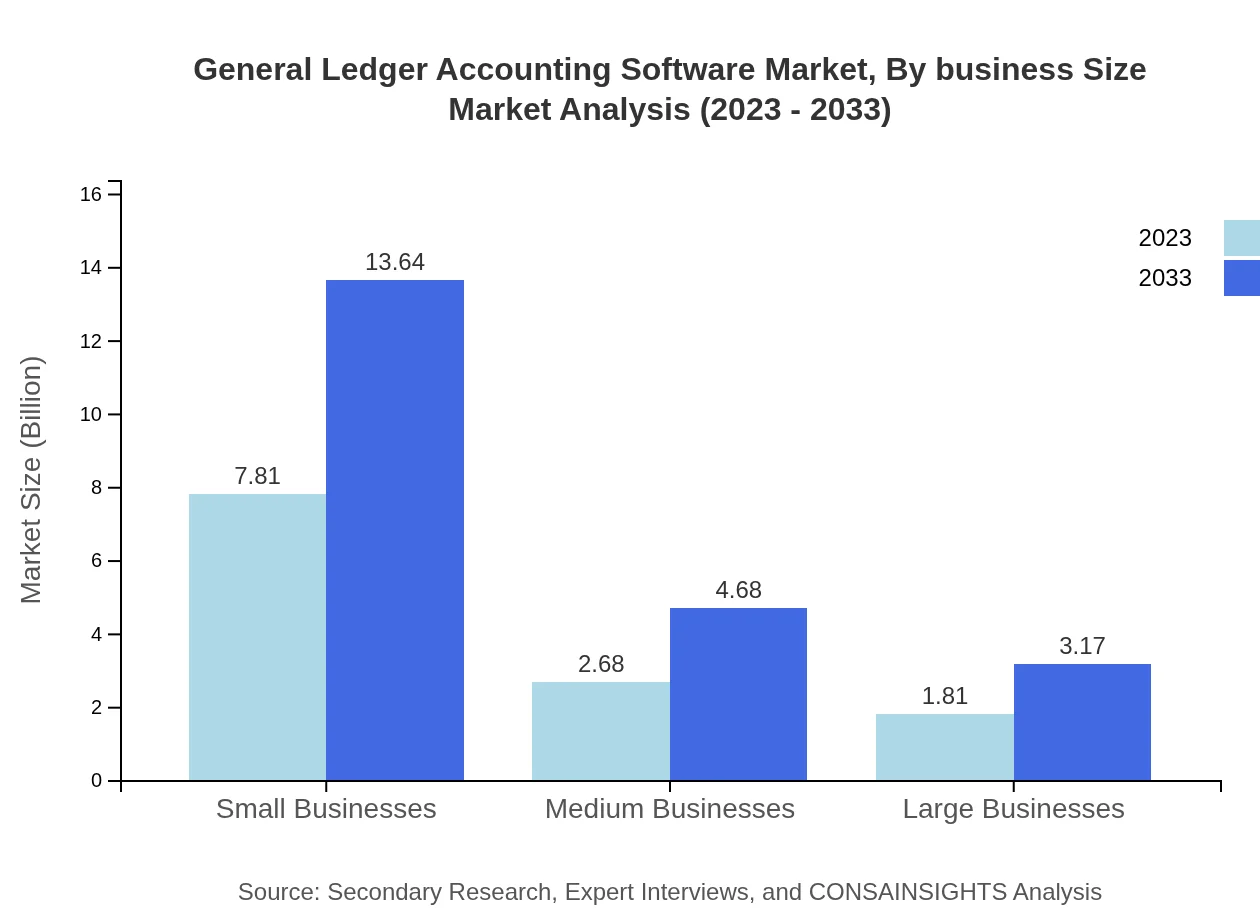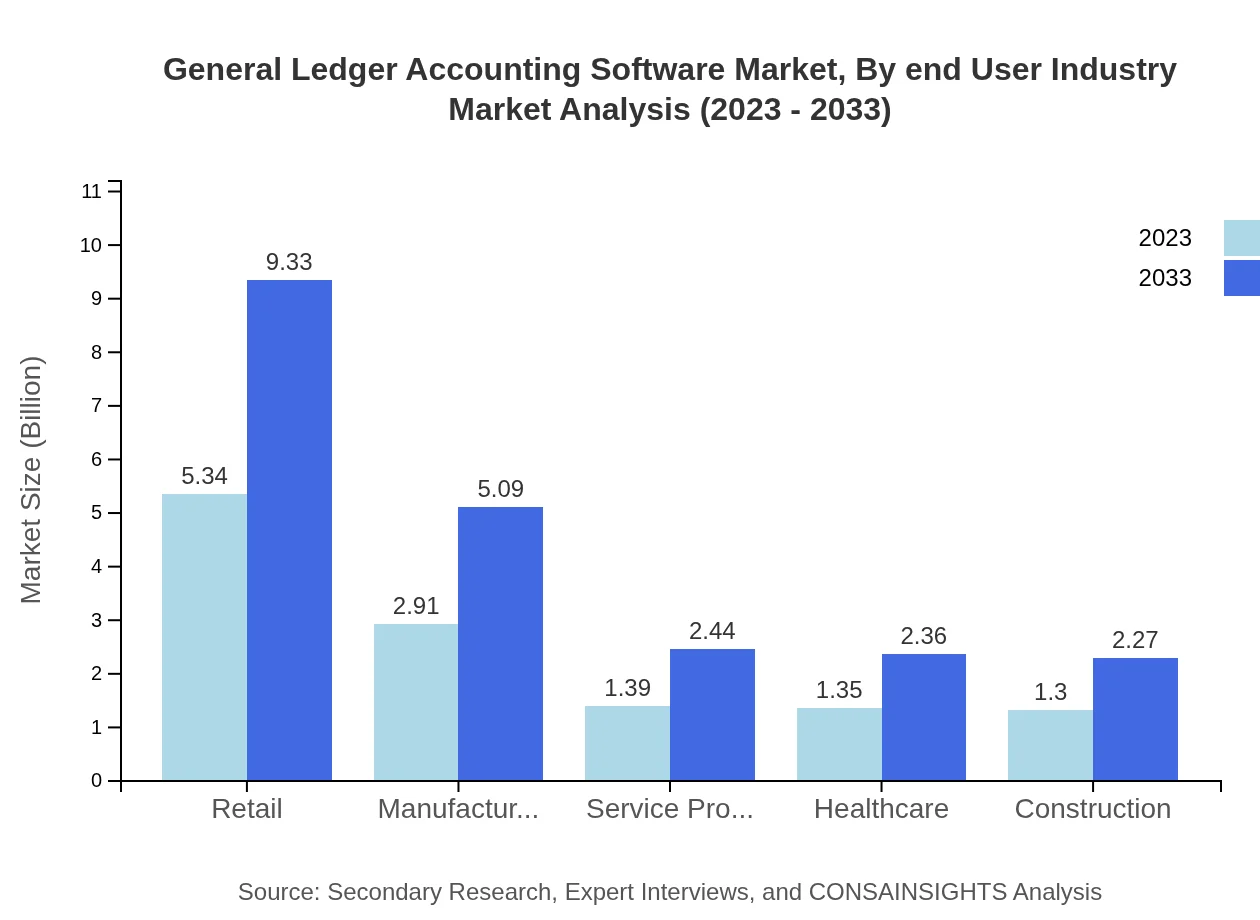General Ledger Accounting Software Market Report
Published Date: 31 January 2026 | Report Code: general-ledger-accounting-software
General Ledger Accounting Software Market Size, Share, Industry Trends and Forecast to 2033
This report provides an in-depth analysis of the General Ledger Accounting Software market for the forecast period 2023-2033. It includes insights on market size, trends, segmentation, regional dynamics, and competitive landscape.
| Metric | Value |
|---|---|
| Study Period | 2023 - 2033 |
| 2023 Market Size | $12.30 Billion |
| CAGR (2023-2033) | 5.6% |
| 2033 Market Size | $21.48 Billion |
| Top Companies | Intuit Inc., SAP SE, Oracle Corporation, Sage Group, Microsoft Corporation |
| Last Modified Date | 31 January 2026 |
General Ledger Accounting Software Market Overview
Customize General Ledger Accounting Software Market Report market research report
- ✔ Get in-depth analysis of General Ledger Accounting Software market size, growth, and forecasts.
- ✔ Understand General Ledger Accounting Software's regional dynamics and industry-specific trends.
- ✔ Identify potential applications, end-user demand, and growth segments in General Ledger Accounting Software
What is the Market Size & CAGR of General Ledger Accounting Software market in 2033?
General Ledger Accounting Software Industry Analysis
General Ledger Accounting Software Market Segmentation and Scope
Tell us your focus area and get a customized research report.
General Ledger Accounting Software Market Analysis Report by Region
Europe General Ledger Accounting Software Market Report:
In Europe, the General Ledger Accounting Software market, valued at $4.12 billion in 2023, is anticipated to grow to $7.20 billion by 2033. This growth is driven by stringent regulatory compliance requirements and an increasing focus on transparency in financial reporting.Asia Pacific General Ledger Accounting Software Market Report:
In 2023, the Asia Pacific market size for General Ledger Accounting Software is valued at $2.15 billion, projected to grow to $3.75 billion by 2033. Countries like China and India are major contributors to this growth due to rising business digitization and the increasing adoption of cloud solutions among SMEs and large enterprises alike.North America General Ledger Accounting Software Market Report:
North America holds a significant share of the market, with an estimated size of $4.23 billion in 2023, projected to climb to $7.39 billion by 2033. The high adoption rate of advanced software solutions and strong presence of established players are pivotal to its market dominance.South America General Ledger Accounting Software Market Report:
The South American market, starting at $0.75 billion in 2023, is expected to reach $1.31 billion by 2033. The growth is primarily attributed to the need for improved financial management practices and the ongoing digital transformation initiatives across various industries.Middle East & Africa General Ledger Accounting Software Market Report:
The market in the Middle East and Africa is smaller, starting at $1.05 billion in 2023 and growing to $1.83 billion by 2033. The region shows potential for growth as businesses invest in automation and digital solutions to enhance their financial management.Tell us your focus area and get a customized research report.
General Ledger Accounting Software Market Analysis By Product
The General Ledger Accounting Software market is significantly influenced by products such as Cloud-Based Software, On-Premises Software, Web-Based Solutions, and Accounting Services. Cloud-based solutions dominate the market with a size of $7.81 billion projected to grow to $13.64 billion by 2033, capturing a 63.49% market share in both 2023 and 2033.
General Ledger Accounting Software Market Analysis By Application
Segmented into small and medium businesses and enterprises, the application component reflects significant adoption across various business scales. Small and Medium Businesses (SMBs) represent a substantial market size of $6.94 billion in 2023, climbing to $12.12 billion by 2033, indicating their strong reliance on effective financial management solutions.
General Ledger Accounting Software Market Analysis By Technology
Technological advancements, particularly in AI and machine learning, shape the market. Intelligent automation is expected to grow from $1.81 billion in 2023 to $3.17 billion by 2033. These innovations help businesses streamline accounting processes and enhance decision-making through data analytics.
General Ledger Accounting Software Market Analysis By Business Size
The market dynamics are influenced by business sizes, with small businesses leading the market at $7.81 billion in 2023 and projected to reach $13.64 billion by 2033. Additionally, medium and large businesses also demonstrate notable growth, emphasizing the need for tailored financial solutions.
General Ledger Accounting Software Market Analysis By End User Industry
Industries such as retail, healthcare, manufacturing, and service providers impact the market significantly. The retail segment currently stands at $5.34 billion and will reach $9.33 billion by 2033, showcasing high demand for structured financial systems across various sectors.
General Ledger Accounting Software Market Trends and Future Forecast
Tell us your focus area and get a customized research report.
Global Market Leaders and Top Companies in General Ledger Accounting Software Industry
Intuit Inc.:
Intuit is a leading player in cloud-based accounting software, known for its QuickBooks product line which serves small to medium businesses with effective financial solutions.SAP SE:
SAP SE is a global leader in enterprise resource planning software, offering comprehensive financial management solutions that include General Ledger functionalities.Oracle Corporation:
Oracle provides robust accounting software solutions that cater to large enterprises, enabling advanced financial tracking and reporting capabilities.Sage Group:
Sage specializes in business management solutions and has developed versatile General Ledger software ideal for small and medium enterprises.Microsoft Corporation:
Microsoft offers versatile financial management software integrated within its Dynamics 365 suite, aimed at enhancing business productivity and efficiency.We're grateful to work with incredible clients.









FAQs
What is the market size of general Ledger Accounting Software?
The general ledger accounting software market is projected to reach a size of $12.3 billion by 2033, growing at a CAGR of 5.6%. This growth indicates a strong demand for efficient accounting solutions in various sectors over the coming years.
What are the key market players or companies in this general Ledger Accounting Software industry?
Prominent companies in the general ledger accounting software industry include Intuit, SAP, Oracle, and Microsoft. These players dominate the market by offering innovative features and robust solutions that cater to different business needs.
What are the primary factors driving the growth in the general Ledger Accounting Software industry?
Key drivers for growth include the increasing adoption of cloud-based solutions, the growing need for automation in accounting processes, and regulatory compliance requirements. These factors encourage businesses to invest in advanced accounting software.
Which region is the fastest Growing in the general Ledger Accounting Software?
Among various regions, Europe is projected to be the fastest-growing market for general ledger accounting software, expected to rise from $4.12 billion in 2023 to $7.20 billion by 2033, indicating substantial growth potential.
Does ConsaInsights provide customized market report data for the general Ledger Accounting Software industry?
Yes, ConsaInsights offers customized market report data tailored to specific business needs. This allows clients to gain insights into market dynamics, trends, and competitive landscape, ensuring informed decision-making.
What deliverables can I expect from this general Ledger Accounting Software market research project?
Deliverables from this project include detailed market analyses, forecasts, competitive landscape reports, and segment-specific insights. Clients will receive comprehensive data that aids in strategic planning and market positioning.
What are the market trends of general Ledger Accounting Software?
Current trends in the general ledger accounting software market include a shift toward cloud-based solutions, increasing use of AI for data processing, and a growing emphasis on user-friendly interfaces to enhance accessibility for businesses.
What is the projected market size by segments for general Ledger Accounting Software in 2033?
By 2033, cloud-based software is expected to dominate with $13.64 billion, followed by web-based solutions at $13.64 billion. Small and medium businesses' share is estimated to be 56.41%, highlighting the segments driving the market.

